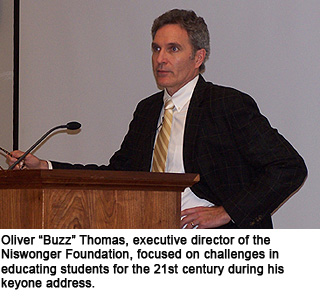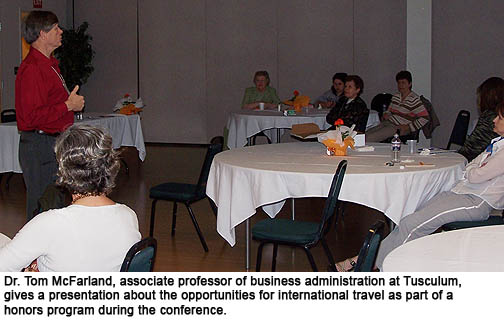 Oliver “Buzz” Thomas addressed how educators can prepare students for life in the 21st century world with global competition and a pluralistic society during the Appalachian College Association (ACA) Honors Program Conference.
Oliver “Buzz” Thomas addressed how educators can prepare students for life in the 21st century world with global competition and a pluralistic society during the Appalachian College Association (ACA) Honors Program Conference.
Thomas, executive director of the Niswonger Foundation, was the keynote speaker for the opening dinner Friday of the second annual ACA Honors Program Conference hosted by Tusculum College. Representatives from nine colleges in Kentucky, North Carolina, Tennessee, Virginia and West Virginia attended the conference.
“Knowledge drives the world economy today,” Thomas said, adding that the majority of jobs in the United States are dependent on what an individual knows rather than what he or she does.
At the same time, education in other countries has caught up with what is found in the U.S, Thomas noted.
“It means that our students are competing with the whole world,” he said, leading to a question for educators of how they can prepare students to compete successfully in a world where there is someone who has the same skills but can do it at a lower cost.
Thomas said he had been giving much thought to that question and has had an “epiphany. Yes, we have to do math and science, raise standards and aim higher with more rigor and relevance at every level,” he continued. “Yet, if we do all that, we will still miss the boat.
“Think about people like Steve Jobs, Bill Gates and Albert Einstein. What distinguished these people from those around them that had the same intelligence and skills?”
Creativity was the distinguishing factor, Thomas said, and education needs to nurture this creativity in students. However, he said, when cuts are made in educational programs, those that are eliminated first are often the music, theater, and art programs that help nurture the creativity that helps students “soar, dream, imagine and create.”
The federal No Child Left Behind program was needed to set up an accountability system, he said. However, in the effort to bring the performance up of students who are doing poorly, it has meant that the brightest students are not being challenged to grow intellectually.
“At the end of the day, every student needs an IEP (Individual Education Program),” he said. Educators who work with honors students on whatever level are working with the individuals who will drive the economy in the future, Thomas added.
What has made the United States a great power is its large middle class, but Thomas said he fears that in the future the nation will look like Sevier County, where a few people are in control while most people work in service-related jobs with low pay.
Educators can help prevent this from happening and prepare students to be successful and prosper in two ways, he said.
One is nurturing students’ creativity through the arts and other programs, Thomas continued. The other is to “keep resisting the temptation to treat education as if it is acquiring a body of knowledge. School is not about filling a bucket but about giving students the skills they need to reinvent themselves over and over,” he said.
Reinvention is important in an economy as today’s when people change jobs many times in their careers, Thomas said. Students need to learn how to find and use information, critically think, problem solve and work in groups, he continued.
Another challenge for educators, he said, is a civic challenge – to teach students to live civilly in a pluralistic society.
Rhetorically asking what makes a person an American, Thomas answered that it was not a place of birth, a race, a religion or a language, but an adherence to the principles and ideals found in the Constitution and Bills of Rights. Educators face the challenge of raising the next generation of Americans, he said. “It is teachers who will determine whether the American experiment of liberty will survive from this generation to the next.”
 On Saturday, the Honors Conference included workshops on incorporating travel opportunities into the Honors classroom, incorporating service opportunities into the Honors classroom and incorporating scholarly opportunities such as research and publication into the Honors classroom. Among those presenting during the workshops were two Tusculum College professors Dr. Tom McFarland, associate professor of business administration, and Dr. Nancy Thomas, associate professor of English. Thomas is director of the Honors Program at Tusculum and McFarland serves on the Honors Council.
On Saturday, the Honors Conference included workshops on incorporating travel opportunities into the Honors classroom, incorporating service opportunities into the Honors classroom and incorporating scholarly opportunities such as research and publication into the Honors classroom. Among those presenting during the workshops were two Tusculum College professors Dr. Tom McFarland, associate professor of business administration, and Dr. Nancy Thomas, associate professor of English. Thomas is director of the Honors Program at Tusculum and McFarland serves on the Honors Council.


